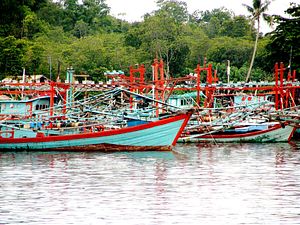Indonesia will look to use data from miniature satellites around the world to seize illegal fishing vessels in its waters following an agreement inked with a Silicon Valley tech firm this week.
The pact, announced on April 27, was signed between the country’s fisheries minister, Susi Pudjiastuti, and Spire Global, a satellite-powered data company which offers products for global ship tracking and high frequency weather data. It is expected be a boost for the country’s war on illegal fishing as it will allow better monitoring of the country’s 5.8 million square kilometer exclusive economic zone (EEZ).
As I’ve written previously, Indonesia under President Joko “Jokowi” Widodo has launched a tough crackdown on illegal fishing in Indonesian waters, which he says causes the country to suffer annual losses of over $20 billion (See: “Explaining Indonesia’s ‘Sink the Vessels’ Policy Under Jokowi”). That has resulted in a series of highly public sinking of boats from neighboring countries through 2015 – part of what Jokowi has described as a “shock therapy” approach in spite of concerns among some of Indonesia’s neighbors.
Spire’s nanosatellites – which it describes as “bottle-sized” – will collect data on ships’ identity and location from their transponders, map out their movements and communicate this information to Indonesian authorities, allowing them to quickly respond to any suspicious or illegal activity in the country’s waters.
“Illegal fishing has vast negative economic and humanitarian implications globally. We are pleased to be collaborating with the government of Indonesia to secure, monitor and grow the country’s maritime ecosystem,” Spire CEO Peter Platzer said in a statement.
While it is unclear exactly how both parties will go about implementing the agreement, it could further enable Indonesia to enforce laws within its waters, including through sinking more vessels. Indonesia has sunk a total of 174 illegal fishing boats thus far, while 20 others could also be sunk following ongoing court rulings. Just earlier this month, Indonesia blew up 23 foreign vessels just two weeks after a maritime confrontation with China (See: “Will Indonesia’s South China Sea Policy Change Amid China’s Assertiveness?”).
































